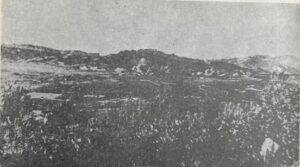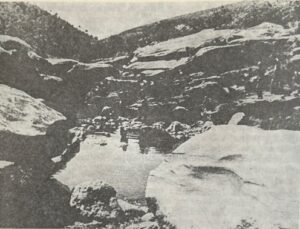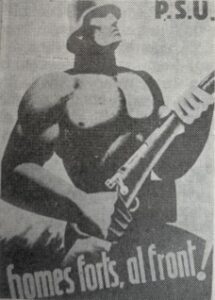HARD DAYS ON THE EBRO by Marko Peric
The “Spanija” series translates selected autobiographical accounts by Yugoslavian and Montenegrin volunteers of their actions in the Spanish Civil War. Dr. Ray Hoff used Google translate from Croatian to English and he edited the selections. As this is a machine translation, the idiomatic features of Croatian or Serbian and the translation of names and places are “best effort”. The full five-volume collection was entitled:
“The Participants write Spanija 1936-1939: collection of memories of Yugoslav volunteers in the Spanish War”
It was assembled by Editor-in-Chief Cedo Kapor and published by the Initiative Committee of the Association of Spanish Fighters, The War History of our Peoples, Book 130, Military Publishing Institute, Belgrade, Yugoslavia, 1971, 5 volumes.
Chris Brooks posted and provided links to volunteers.
HARD DAYS ON THE EBRO[1]
Marko Peric, Spanija, Volume 3, pp. 487-492
At the last position we held on the Ebro, I was assigned to the Yugoslav company commanded by Kosta Nad and Peko Dapčević.
On one occasion, when my colleague was on duty in the Company Command, I was released and entered the trench among my Comrades. There, one Comrade[2] in particular caught my eye, who looked like a malnourished child for his age. He was very lively and proactive, and everyone loved him. They told me about him that he was in prison before Spain and that he knew Comrade Moša Pijade from there, which seemed a bit unbelievable to me. And it was true.
Before we got to this position, our troops, somewhat further north, made a big breakthrough across the Ebro River. One night, the Poles forded the river in the greatest silence, created a bridgehead and rushed into the rear of the enemy. Other units followed them. In just one night, our men penetrated about 20 km deep into enemy territory. The enemy was surprised. Our men captured their officers in their headquarters and in their beds. It was a great success of the Republican Army.
At the same time, it was necessary for the Republican forces to make such a breakthrough from the south to the north, so as to cut the entire belt held by the Fascists all the way to the Mediterranean Sea, which split the Republican territory into two separate parts without a land connection. But a sudden deep penetration was made only from the north in the direction of the city of Gandesa, while this was not done from the south.
We held our last position on the Ebro a little south of the place where the “pocket” across the Ebro started. From our trenches, we could see the distant hills from which the Fascists, from the direction of Gandesa, were making terrible attacks to drive our forces back, back to the river. There was constant thunder and rumbling from that direction. The whole neighborhood was in flames and smoke. Enemy planes constantly flew over those hills, so from afar it looked like not even a living soul could survive there.
 Front Ebro sector near Gandesa
Front Ebro sector near Gandesa
All day long enemy bombers flew over the river and bombed the temporary pontoon bridges, which our special units were constantly repairing and training for use. Because trucks with troops for replenishment crossed those bridges, took away masses of wounded, brought in food and ammunition, which was wasted in that sector.
One day, an order came for our battalion to move in that direction. I must admit, it was not easy for me. I felt like we were going to hell. The trucks in which we were transferring approached the pontoon bridge.
Before that, we passed by a makeshift ” bridge” made of ropes and rags, which served to deceive enemy aviation and ease the situation on the real bridge. We barely got close to the pontoon bridge.
Trucks wound between the many craters from the exploded bombs. In some places, the soldiers, who were specially designated for this, would hastily shovel earth into the craters so that we could pass. Namely, in some places the bombs fell so thickly that there wasn’t even enough flat land left for a truck to pass through.
The pontoon bridge we crossed was highly damaged and patched in places. But we still crossed the river happily. For several minutes, which was the duration of our crossing, we did not come across not a single enemy plane.
On the other side of the river, the situation was the same as at the approaches to the bridge. And the first village we came across on the other side was in ruins and on fire. We barely made our way between the destroyed houses.
As soon as we entered the field dotted with olive trees, vineyards and figs, we noticed airplanes circling the sky high on the horizon in front of us. The longer we drove, the more and more they were standing around, terrible people who are just waiting for an opportune moment to come back towards us and put us to sleep with deadly bombs and bullets.
We did not wait for them idly. Our machine guns were standing on the driver’s cabins ready to quickly open fire on the plane that would attack us. As soon as one of us noticed that a plane was separating from the flock and starting to approach us, he would bang his hand on the driver’s side. The driver would immediately stop the truck and we would all quickly jump out, immediately scatter in the nearby fields, and lay down in some kind of ditches or furrows. At the same time, machine gunners would place machine guns in places suitable for shooting at planes.
In our truck, Rijevac, a native of Istria, who as an emigrant in Yugoslavia was convicted of communism and served several years in prison, would have noticed the plane with his sharp vision.
We were in great tension all along the way. Enemy planes were constantly in the air, and we had to reach our destination as soon as possible. We would often jump out of the truck, expecting an attack that never came, and quickly get back in the truck to continue our journey.
Along the way, we encountered the remains of trucks that were attacked by enemy aviation. They were smashed by bombs or riddled with machine guns.
When we stopped at one place to hide from a possible attack by an airplane, which very suspiciously approached our column, a truck full of ammunition overtook us and sped past. We pointed to the sky to the truck driver, but he just waved his hand, increased his speed and got lost behind a curve.
Suddenly the plane, which we were watching and from which we took shelter, suddenly came back. After that there was a deafening explosion. On the way, we came across a large crater, and pieces of trucks and ammunition crates were lying around it, and the remains of a downed plane were burning in a field not many hundreds of meters away. It seems that the explosion of ammunition in the truck also affected the plane.
We luckily, without casualties, arrived at our positions, in that hell that for a while we only observed from afar with fear. But when a person finds himself in the middle of events as one of their actors, things do not seem quite as terrible as when he passively observes them from afar and creates possible and impossible images and situations in his imagination. However, this time, it seems to me that reality has surpassed all imagination.
Our positions were at a height towards Gandesa, with trenches on the slope towards the enemy. We were in those trenches a quick part of the Battalion, while the other was located on the slope facing our rear. I was with that other part of the Battalion.
The terrain was terraced. After every ten meters of flat ground, a vertical step built with stones, two to three meters high, rose. As soon as we arrived, we started digging corridors deep into the ground under the terraces. When they reached two to three meters deep, we would dig towards each other to meet. Connecting the corridors was particularly important. We soon felt that.
In fact, it wasn’t even daybreak yet, when the rapid artillery fire started on our positions, probably from about 200 rounds. It was raining shells.
Above our heads we heard a continuous hissing characteristic of the flight of a shell. If one fell near our corridor, which we have not yet managed to connect with the neighboring one, we would feel a strong blow of air, which was difficult to bear. We feverishly rushed forward to reach our neighbors as soon as possible. As soon as we managed to connect with him through even a small opening, we would feel a slightly stronger draft during the explosion of a shell nearby.
As an “old artilleryman”, I explained to my comrades that the barrels of the enemy’s cannons would heat up from the rapid fire, so they would have to stop the hurricane fire with which they showered us. However, one hour passed and the fire did not subside.
Another hour also passed. Along with the constant rain of artillery shells came waves of enemy planes that showered us with bombs.
There were comrades who in that hell of explosions, smoke, stench and dust they could no longer rest sheltered in the trench corridors. They ran out, into the open, and — died.
There were trenches on the front side of the hill in many places which were buried.
In these conditions, even the medical system could not function properly. The ties were severed. The connection of the installed phone lines soon turned out to be illusory. While we would connect the torn wires in one place, in two or three others sometimes the shells would tear them apart again and again. Food and ammunition could not be delivered during the day.
When night fell, the “golpes de mano” would begin its raids. Either our men would be attracted to their trenches and bombard them with hand grenades and rapid machine gun and rifle fire to drive them out of the trenches, or they would counterattack to regain their old trenches, that is, to drive ours out of them. Almost the whole night, with small interruptions, it boiled like a cauldron, and the sky was lit up every hour by lightning from the explosions of hand grenades.
The next morning, I got off my position about a kilometer away from the front lines. There was the main part of our liaison company, hidden in a barranco that ran parallel to the front line. On the side facing the front, the fighters had shelters where they were protected from enemy artillery. Only bombs from airplanes posed a slightly greater danger.
There was straw in the shelters and you could lie down quite comfortably in them. However, we did not like to enter them. Those shelters were dug by the units that were here earlier, so there were many weeds in the straw. But when the enemy aviation, which appeared on this front in massive waves and densely sowed its devastating bombs over the entire terrain, would come across, we had nowhere but to get into those shelters.
After such an attack, a friend of mine, who had distinguished himself several times earlier with his heroism, approached me and said in confidence:
“I’m afraid!”
“And who isn’t afraid?” I asked him. — “I’m afraid too. We are all afraid. So that we are not afraid, when it is so terrible. But what can we do? We have to fight. You have to overcome the fear in yourself and endure this too.”
At these words of mine, which were said sincerely, he somehow calmed down. It must be admitted, there were indeed many reasons for fear. The constant noise of constant detonations in the near and far surroundings, even in the immediate vicinity, made it harder for the nerves to bear. The air trembled from the noise created by the mass of the planes, and the ground trembled from the impact of their heavy bombs.
The Battalion was simply melting away.
There were more and more wounded and dead. When I was going back to the positions in the evening, I could hardly orientate myself. There is no trace left of the house and therefore of the hay in its yard, past which the path passed. The darkness below the elevation where our positions were was no longer standing. The entire field was torn up and torn apart as if they had some monstrous bulldozers plowed it over. It was hard to imagine that this whole hill was in terraces just yesterday.
 Swimming behind the front line
Swimming behind the front line
If by some chance the rain of shells stopped raining on us and the horizon became clear, without enemy planes, we would hear our artillery coming from somewhere in the background. Our artillerymen would pull the cannons out of their shelters, which had been dropped for them to protect them from enemy bombs and long-range artillery, and hastily fire a few shells. After that, it would be better to get them into their shelters fast, because the enemy artillery would immediately start firing in that direction.
Sometimes our fighters also appeared. This would usually be around the time the enemy planes returned to their bases. Our fighters were flying very low. They would slip through canyons so that the enemy would not observe them earlier, suddenly appear over enemy trenches, shower them with machine gun fire and bombs, and quickly disappear.
One day they didn’t manage to get away in time. A desperate struggle ensued. Several “chatos”, as the Spaniards affectionately called the fighters with a “nose”, received from the Soviet Union, fought with a numerically superior enemy. They fought really bravely. They defended and attacked. But when there are two “Chatos” fell, on fire, the others escaped from that uneven fight.
In such a situation, it was also a success. There, in those positions, in such conditions, our battalion lasted ten days. After that we were withdrawn from the front. We were returning, the whole battalion, in two or three trucks.
Many comrades remained forever on the destroyed hill, and even more wounded were transferred to hospitals. Among the wounded were Zikica Jovanović, Kosta Nad, Peko Dapčevic and many others. Mujkić, an old prisoner, who transferred from the artillery in the rear at his own request to our Battalion at the front, had both legs blown off by a shell. He soon died from massive blood loss. In that terrible fire, an ambulance could not be provided to help him.
Not a single unit could last more than ten days in these positions. After that, it would return to the rear more than decimated, just like our Battalion.
—
[1] From Marko Perić’s book: “Experiences of a Spaniard“, p. 101-110, edition “Stvarnost”, Zagreb, 1963.
[2] Ljuba Živković was a communist and prisoner, who after his return from Spain played a significant role in organizing the party organization in Vojvodina and raising uprisings. He died in NOR and stayed in memories for generations under the name “Ljupče-Spanac“.













